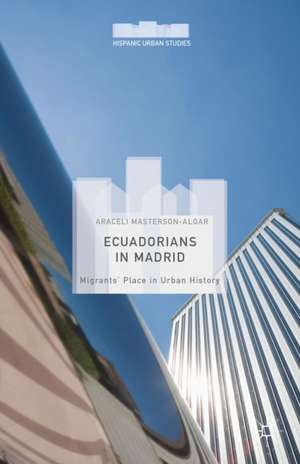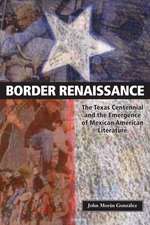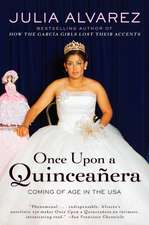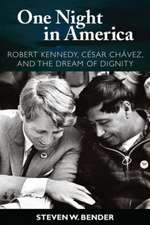Ecuadorians in Madrid: Migrants' Place in Urban History: Hispanic Urban Studies
Autor Araceli Masterson-Algaren Limba Engleză Hardback – 12 ian 2016
| Toate formatele și edițiile | Preț | Express |
|---|---|---|
| Paperback (1) | 392.60 lei 6-8 săpt. | |
| Palgrave Macmillan US – 13 ian 2016 | 392.60 lei 6-8 săpt. | |
| Hardback (1) | 391.22 lei 6-8 săpt. | |
| Palgrave Macmillan US – 12 ian 2016 | 391.22 lei 6-8 săpt. |
Preț: 391.22 lei
Nou
Puncte Express: 587
Preț estimativ în valută:
74.86€ • 78.17$ • 61.82£
74.86€ • 78.17$ • 61.82£
Carte tipărită la comandă
Livrare economică 15-29 aprilie
Preluare comenzi: 021 569.72.76
Specificații
ISBN-13: 9781137536068
ISBN-10: 1137536063
Pagini: 287
Ilustrații: VII, 287 p.
Dimensiuni: 140 x 216 x 18 mm
Greutate: 0.49 kg
Ediția:1st ed. 2016
Editura: Palgrave Macmillan US
Colecția Palgrave Macmillan
Seria Hispanic Urban Studies
Locul publicării:New York, United States
ISBN-10: 1137536063
Pagini: 287
Ilustrații: VII, 287 p.
Dimensiuni: 140 x 216 x 18 mm
Greutate: 0.49 kg
Ediția:1st ed. 2016
Editura: Palgrave Macmillan US
Colecția Palgrave Macmillan
Seria Hispanic Urban Studies
Locul publicării:New York, United States
Cuprins
1. Ecuador in Madrid/Madrid in Ecuador: Transnational Dynamics Between Ecuador and Spain in the Twenty-First Century
2. Beginning of the Itinerary: Madrid's Subway
3. First Stop, Lago: Lakes and Lacunaes in Madrid's Parks
4. Second Stop, Nuevos Ministerios: Planning Madrid's Nightlife
5. End of the Itinerary, Airport: Building Transnational Real State
2. Beginning of the Itinerary: Madrid's Subway
3. First Stop, Lago: Lakes and Lacunaes in Madrid's Parks
4. Second Stop, Nuevos Ministerios: Planning Madrid's Nightlife
5. End of the Itinerary, Airport: Building Transnational Real State
Recenzii
“In Ecuadorians in Madrid, Araceli Masterson-Algar … sets out to explore the role of this collective in shaping everyday urban life on both sides of the Atlantic. … Masterson-Algar sheds light on migrant urban life in millennial Madrid, where the city could prove at once hostile and beguiling to its newest residents. … Ecuadorians in Madrid is a welcome and important addition to the scholarship on contemporary Spanish urbanism and the spatialization of migration.” (Sophie Gonick, EuropeNow, europenowjournal.org, July, 2017)
Notă biografică
Araceli Masterson-Algar is Associate Editor of the Journal of Urban Cultural Studies and Associate Professor at Augustana College, USA.
Textul de pe ultima copertă
In the decade between 1998-2008, Spain became the main destination for Ecuadorian migrants, and Madrid, Spain's capital, became the city with the largest Ecuadorian population outside of Ecuador. Through a combination of ethnographic research and cultural analysis, this book addresses the interconnections between spatial practices, cultural production, and definitions of citizenship in migration dynamics between Ecuador and Spain, showing how Ecuadorians are key actors in Madrid's recent urban history. Looking at the city as form and content, constitutive and constituting of ideological processes, each chapter analyzes the spatial practices of Madrid's Ecuadorian residents through various forms: the body, the home, public and leisure spaces, the city, the nation, and transnational circuits. Rather than addressing migrants as a general human type marked by (dis)placement, each chapter offers an illustration of how Ecuadorian migrants forge transnational processes through their everyday lives in specific time and place, and how these processes manifest culturally on both sides of the Atlantic.






















